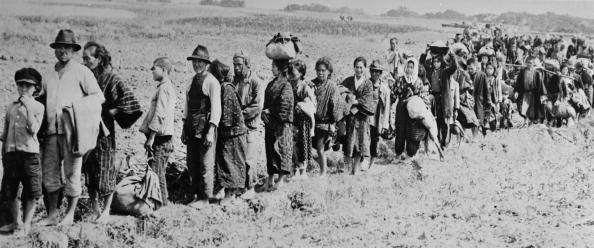Example Sub Topic Two
Japan’s Occupation of Manchuria, China
Japan is a small island nation on the edge of Asia not far from China and Korea. Following the visit by Commodore Perry, showcasing Western Civilization and industrialization the tiny island nation began its own process of industrializing and soon realized that it needed more resources to compete with the rest of the world which was continuing to grow around it. In lieu of this it needed land rich in resources to expand. Japan believed that colonization was the key and if it did not then it would never move forward. Looking at what Europe had done 400 years before in the Americas and had continued to do in Africa and Asia, Japan looked towards neighboring countries, and planned to expand towards mainland Asia. Since Japan had started late in the game of colonizing she found herself in disagreement with Russia over land in Asia. Japan fought Russia in the Russo-Japanese War in 1904 and 1905 and won, setting the attitude that they were now a contender in the world.[1] This gave Japan the confidence it needed to colonize Korea in 1910. Still the need for land was a strong fever and the nation could not stop. The next stop for Japan was China. The focus is on China and how the occupation of China began. Japan did not want to outright invade China, the League of Nations, was put in place to stop violent actions following World War One. The United States although not a part of the League was close to many of the countries within the League as well. The U.S. also supported many of the nations within the League. Japan being a part of the League had to follow the rules and regulations that were established after World War One as well. This meant that outright invasion was out of the question. Japanese occupation of China was illegitimate for many reasons. The first was the Lytton Report, a commission looking into the case that China gave to the League of Nations claiming the Japanese were in the wrong for occupying Manchuria. The second piece of evidence is the puppet state of Manchukuo not being recognized by anyone except the country of Japan. Lastly Japan’s withdrawal from the League of Nations on February 24th, 1933 shows the verdict being made and Japan not agreeing.
Japan tried to justify its capture of Manchuria in China by staging an incident. The Japanese military staged the Manchurian Incident at 10:20 P.M, an explosion of blasting powder went off, creating a large dust cloud and was shortly followed by a Japanese patrol finding it and reporting that the Chinese had tried to destroy the railroad line. Within the hour Japanese forces were in combat with the Chinese, steadily pushing them out of the Manchuria region. When the sun came up the Japanese air force joined in and fighting broke out, the Japanese military had successful created an incident to acquire resource rich land.[2]
Japan first lost its official claim, but not physical claim of Manchuria, China because of the League's policy on aggression. Shortly following the Manchurian incident China appealed to the League of Nations. The League of Nations sent Victor Bulwer-Lytton to investigate, He along with four others commissioned to investigate spent six weeks in China. The commission personal looked over the section of the railroad Japan claimed was where the explosive went off. A 146 page document that was later called the Lytton Report was given to the League in 1932. The report found Japan was the aggravator in the situation. [3] Given that Japan was a part of the League of Nations it had to acknowledge the Report’s findings and solutions to fix the Situation. Japan’s lack of following through with the considerations and suggestions to the council shows that it was ignoring what a good portion of the world believed to be the right choice.[4] Even into the war in China Japan failed to follow codes and laws the League was put into place. Further supporting the idea that the occupation of Manchuria, China was unjustified. Gas soldiers were trained in the Japanese military and part of their training was to retrieve all evidence of gas being used. Poison gas had been outlawed in war by the Geneva Convention[5]
Bibliography
Burkman, Thomas W. 1995. “Japan and the League of Nations.” World Affairs 158 (1): 45. https://manowar.tamucc.edu/login?url=http://search.ebscohost.com/login.aspx?direct=true&db=a9h&AN=9507273188&site=ehost-live&scope=site.
Haruko Taya Cook and Theodore F. Cook, Japan At War: An Oral History, The New York Press, 1992,
V. A. G. R. Bulwer-Lytton, Report of the commission of Enquiry, League of Nations Appeal by the Chinese Government, World digital Library
Wilson, Sandra. "The Manchurian Crisis and Moderate Japanese Intellectuals: The Japan Council of the Institute of Pacific Relations." Modern Asian Studies 26, no. 3 (1992): 507-44. http://www.jstor.org/stable/312552.
[1] Rustin Gates,Solving the “Manchurian Problem”: Uchida Yasuya and Japanese Foreign Affairs before the Second World War,2012, PG 23
[2] Wilson, Sandra. "The Manchurian Crisis and Moderate Japanese Intellectuals: The Japan Council of the Institute of Pacific Relations." Modern Asian Studies 26, no. 3 (1992): 507-44. http://www.jstor.org/stable/312552. Pg 508
[3] Report of the commission of Enquiry, League of Nations Appeal by the Chinese Government, World digital Library Pg 66-67
[4] Report of the commission of Enquiry, League of Nations Appeal by the Chinese Government, World digital Library Pg 132-133
[5] Haruko Taya Cook and Theodore F. Cook, Japan At War: An Oral History, The New York Press, 1992, Pg 44-45
